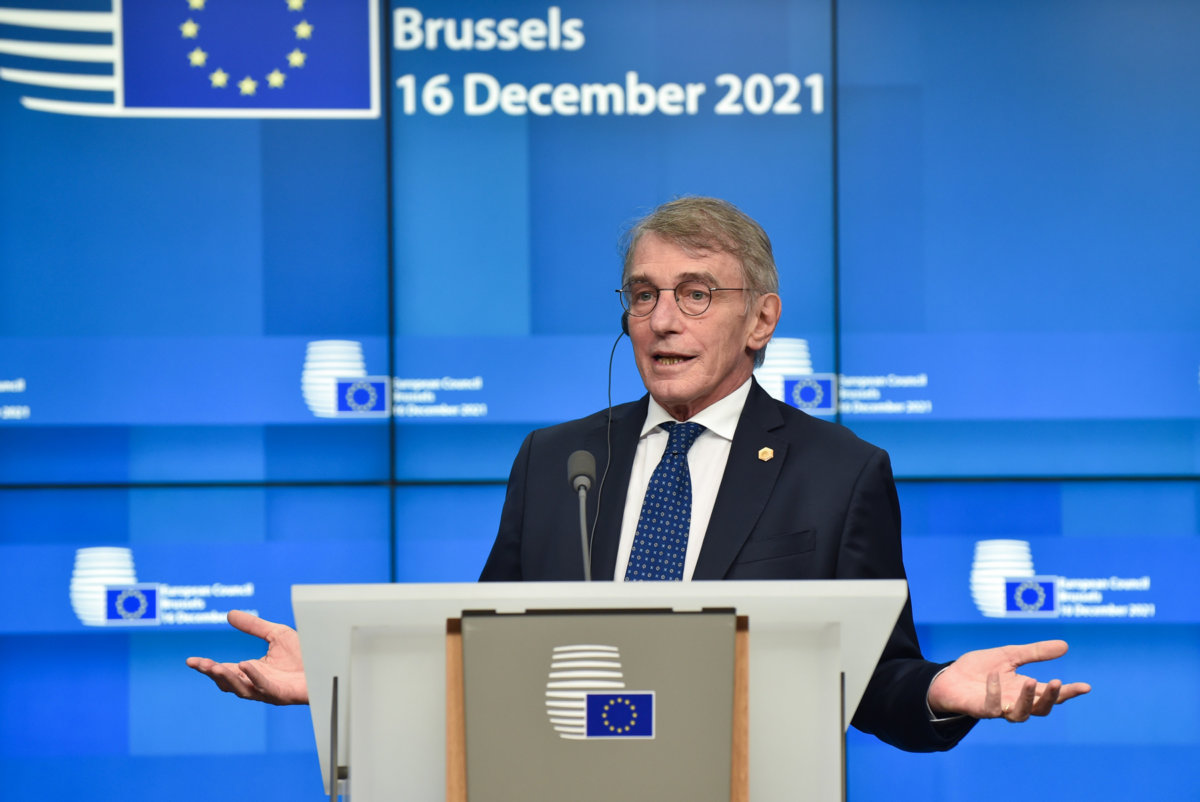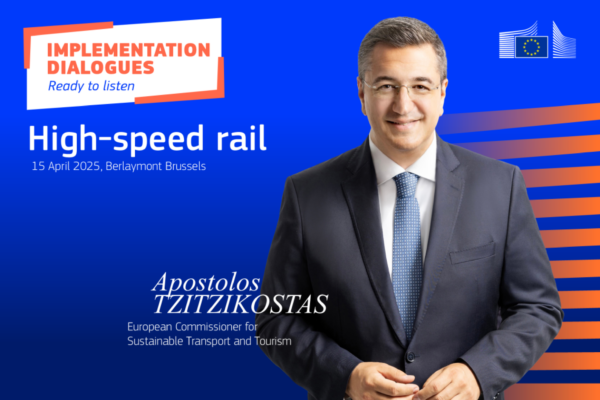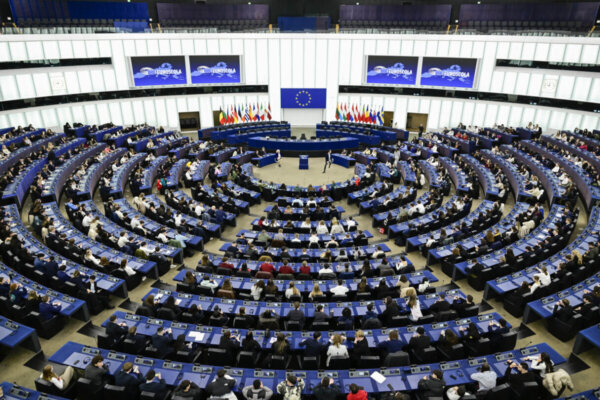Η Ευρώπη χρειάζεται ένα νέο όραμα που θα παρέχει καινοτομία, προστασία και ελπίδα, δήλωσε ο προέδρος του ΕΚ, Νταβίντ Σασσόλι, στους ηγέτες της ΕΕ.
Κατά τη διάρκεια της ομιλίας του στη σύνοδο κορυφής της ΕΕ στις Βρυξέλλες, ο πρόεδρος του Ευρωπαϊκού Κοινοβουλίου Νταβίντ Σασόλι επέστησε την προσοχή των ηγετών της ΕΕ στα κενά που κατά τη γνώμη του υπάρχουν στο ευρωπαϊκό οικοδόμημα στο σύνολό του – και όχι μόνο στα τρέχοντα ζητήματα της επικαιρότητας.
Η Ευρώπη έχει σημειώσει σημαντική πρόοδο σε πολλούς διαφορετικούς τομείς πολιτικής, όπως είναι η Πράσινη Συμφωνία και η ψηφιακή μετάβαση. Η πανδημία του κορονοϊού δεν έχει, ωστόσο, επιτρέψει στην ΕΕ να κάνει τις προόδους που θα έπρεπε, υπογράμμισε ο προέδρος Σασόλι.
Η Ευρώπη χρειάζεται λοιπόν ένα νέο όραμα ελπίδας το οποίο «θα μας ενώσει όλους, ένα σχέδιο που θα αντικατοπτρίζει την Ένωση, τις αξίες μας και τον πολιτισμό μας, ένα σχέδιο του οποίου η αξία θα είναι έκδηλη σε όλους τους ευρωπαίους πολίτες και που θα αποτελέσει σημείο αναφοράς.»
Οι τρεις λέξεις-κλειδιά
Σύμφωνα με το όραμα του προέδρου Σασόλι, το νέο σχέδιο θα πρέπει να έχει μια τριπλή προσέγγιση, δημιουργώντας μια Ευρώπη που καινοτομεί, προστατεύει και δείχνει το δρόμο.
Όσον αφορά την καινοτομία, αυτή δεν θα πρέπει να εκλαμβάνεται μόνο ως μια ανάγκη για τεχνική καινοτομία αλλά ως μια γενικότερη ανάγκη καλλιέργειας ενός πνεύματος δημιουργικότητας εντός των θεσμικών οργάνων της ΕΕ, στις πολιτικές και δράσεις της, ακόμα και στον τρόπο ζωής μας. Πρόσθεσε δε ότι η Διάσκεψη για το Μέλλον της Ευρώπης «πρέπει να μας βοηθήσει να ανακαλύψουμε νέους τρόπους αφύπνισης της αίσθησης ότι όλοι οι Ευρωπαίοι μπορούν να ταυτιστούν με το ευρωπαϊκό εγχείρημα.» Τόνισε επίσης την ανάγκη να δοθεί στο Κοινοβούλιο το δικαίωμα της νομοθετικής πρωτοβουλίας και νέους ιδίους πόρους ώστε να ενισχυθούν οι οικονομικές δυνατότητες της ΕΕ.
Όσο αφορά το κομμάτι της προστασίας, ο Σασσόλι υπογράμμισε ότι η ΕΕ πρέπει να προετοιμαστεί καλύτερα για τις μελλοντικές κρίσεις οι οποίες μπορεί να είναι περιβαλλοντικές, οικονομικές, διπλωματικές ή στρατιωτικές. Έδωσε ιδιαίτερη έμφαση στις πολιτικές της ΕΕ για την κοινή άμυνα, τη διαχείριση των εξωτερικών συνόρων, τον κατώτατο μισθό και την ενεργειακή φτώχεια.
Τέλος, η ΕΕ πρέπει να αποτελέσει «φάρο έμπνευσης όχι μόνο για τους πολίτες της Ευρώπης αλλά και εκτός συνόρων» για θέματα δημοκρατίας, ελευθερίας και ευημερίας. «Είναι στο χέρι μας να κάνουμε αυτό το όραμα πραγματικότητα ώστε η Ευρώπη να διατηρήσει την ηγετική της θέση και να τηρήσει τις υποσχέσεις της, προς το συμφέρον όλων των Ευρωπαίων», πρόσθεσε ο προέδρος του Κοινοβουλίου.
Το κείμενο της Ομιλιας:
Ladies and gentlemen,
I should like to share with you my feelings, and Parliament’s feelings, about the challenges awaiting us between now and the end of our term of office, now that we have reached a midway point but still have long way to go.
The pandemic is not subsiding, its end keeps receding from view and we have still not seen the progress which the Union needs – a European project of hope that all our fellow Europeans are expecting. We naturally have ambitious plans for our Europe. These have been on the table since the start of the term and we are pursuing them doggedly, making change happen and finding consensus in our ranks. In short, we are transcending our differences and moving forward. The Green Deal, the digital transition, a stronger and more democratic Europe, and greater social justice are all vital and formidable projects. Europe is driving these forward, and out of allegiance to our fellow citizens we must see them through.
But what Europe also needs, and needs most of all, is a new project of hope – a project to unite us all, a project that embodies our Union, our values and our civilisation, a project whose worth is clear for all Europeans to see and which can be our rallying point.
I think we can build that project on the basis of a powerful three-pronged approach, on three things that all Europeans want Europe to be: a Europe that innovates; a Europe that protects; and a Europe that illuminates.
First and foremost: a Europe that innovates
Innovation, in this case, does not simply mean technological innovation, however vital that may be for our economy. What we need is innovation in all areas – a renewed sense of creativity as regards our institutions, our policy-making, our actions and even our lifestyles, since that is what the green transition demands of us.
The Conference on the Future of Europe should help us find innovative ways of reawakening the feeling that Europe is a project with which all Europeans can identify. The Conference is in full swing, as you know, and it will soon be time for the initial conclusions to be drawn. I will not mince my words: we cannot shirk our responsibilities when the time comes to progress from talking the talk to walking the walk, from saying what we want to doing something about it, from abstract notions to tangible achievements.
There must be innovation across the board!
In terms of its institutions, of course, our Union is still not the finished article; it is a work in progress. Parliament has long advocated a specific approach to making our institutions more democratic, stronger and more innovative, which is to give Parliament a right of legislative initiative.
There must be innovation in our law-making. Our Union must be the pioneer in introducing rules in areas on which the whole world is now focusing, and especially when it comes to regulating new sectors of the economy that are currently a legislative free-for-all. That is what we did for personal data protection, and our example is now being followed the world over. And that is what we will now do for digital markets, to ensure that the web giants do not supplant the people as law-makers!
There must also be innovation in our funding arrangements. We must not fear change or tremble at innovation when it comes to funding our policy actions either. I would once again point out that Parliament and Europe’s citizens are impatient for the arrival of the own resources package, which should allow the Union to sustainably boost its financing potential and repay its mutualised debt. Our credibility is on the line, and we must remain true to our word. Nor will such innovations absolve us of our duty to make our financial framework arrangements fit for purpose – to tackle the challenges of our times – by carrying out a realistic reform of the Stability and Growth Pact. Our future, and that of our children, can no longer be held hostage to the 3% deficit rule.
Secondly: a Europe that protects
We must revitalise the idea that Europe protects us, that Europe protects its citizens and acts with their safety in mind and in the interests of the common good and sovereignty of each of its Member States. That is what we have done with our common policy on vaccines: we have robustly shown that Europe can rise to meet the gravest of crises in order to protect Europeans. We must continue our endeavours to bring about a Health Europe and consolidate our global health architecture so as to step up our prevention, protection and crisis-preparedness efforts. I welcome the decision by the World Health Assembly to open negotiations on a binding anti-pandemic instrument.
Protecting Europeans means being better able to prepare our response to all of tomorrow’s crises – be they environmental, economic, diplomatic or military.
It means, firstly, bolstering our common security and defence policy so that we can act together more swiftly, and more incisively, when our interests are threatened. I know that this will be one of the key issues for the forthcoming French Presidency, and that is a good thing.
Protecting Europeans also involves taking resolute action to better integrate our migration and external border management policies. In my speeches I have often raised the issue of migration and asylum. It is no secret that migration has become a key issue in EU external relations and on our foreign policy agendas. Parliament is already working to improve the Commission’s proposals on the European Pact on Migration and Asylum on the basis of a new solidarity and responsibility pact. The Council will play its part in this too, and we must now find an agreement as a matter of urgency, otherwise populism and short-termism will prevail. Recent events on the border with Belarus have clearly demonstrated the need for determined and solidarity-based action in what is a vital area.
Protecting European citizens also means ensuring that each and every European can earn a living in dignity, on the basis of decent and fair minimum wages, and we again call for an ambitious compromise on this issue. I also welcome the Commission’s proposal on platform workers, as a result of which the social safeguards for millions of European workers should be upgraded.
Protecting Europeans also means restoring a balance when trading relations are out of kilter, when countries present us with threats through their investments or through coercion.
Protecting Europeans means, lastly, finding effective technical and economic responses in the event of an energy crisis. No one in Europe should be abandoned to energy poverty, even when global markets are disrupted by international crises. At these critical times, too, the Union has to find bold solutions to keep all Europeans secure.
Lastly: a Europe that illuminates through its democratic model
There has been talk about resilience for a number of years, and Europe does have to become resilient to economic shocks, to conflicts at its borders, to the eco-crisis, to social crises, and more besides. It goes without saying that we must overcome those crises and take on the challenges they represent, but is resilience the be-all-and-end-all of what we do? Looking to become resilient is in itself, to some extent, an admission of defeat, an acceptance of victimhood, of vulnerability.
Europe must therefore become more than just resilient; it must also rediscover its pride in its democratic model. Our fervent wish must be that this model of democracy, freedom and prosperity serves as a beacon and inspiration not only for our fellow citizens in Europe, but also beyond our borders.
Projecting our democratic model means showing that it is a success, that it produces effective public policies and that it can deliver tangible results thanks to our unwavering determination.
I hope that Europe Day on 9 May next year will see a common, powerful and united demonstration of our commitment to the European project and to the values and civilisation it imparts.
Ladies and gentlemen,
As you will have realised, my observations today have not been confined to matters of current concern. I felt it was important to use this address to draw attention to the gaps in the European project.
‘Innovate, protect, illuminate’ is what I suggest to you should be the three watchwords in the process of renewing our European project. Emmanuel, when I was in Paris last Thursday, I certainly noted the motto that France has chosen for its Presidency of the EU Council: ‘Recovery, strength, belonging’. And I note that this choice of words is consonant with mine:
– because there can be no recovery if we do not innovate;
– because the strength we are seeking for our Union must serve to affirm our vision of the world and thus protect Europeans;
– because Europeans will only have a sense of belonging to Europe if its political model serves as an example and can illuminate.
I am pleased that these two visions of the future converge. It is now up to us to make those visions a reality so that Europe can keep its standing, and its promises, in the service of all Europeans.
Thank you, and I wish you well in your work.




